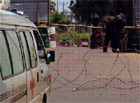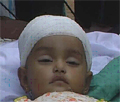 |
 |
 |
||
| << back | |
 |
| Commendable Quote | ||||
 |
A doctorís voice:Dr Sivananthan, a doctor at the Kilinochchi hospital, who was also the District Medical Officer at an earlier time .makes the following statementAbout the hospital Kilinochchi hospital functioned as the district hospital serving the 250,000 people in the district. It has 300 beds, 8 doctors and 20 nurses. Two months ago its status was raised to that of a General hospital when it moved to the new complex. When a hospital is raised to the status of a General hospital its facilities ought to have been upgraded and its medicine requirements also must be upgraded. Most importantly medical experts must be appointed, gynecologist-obstetrician, general physician, general surgeon, and pediatrician, is a must in a general hospital. In addition, in most general hospitals there will be an eye specialist, and an ENT specialist. This hospital has no specialist at all and even the very basic medicine quotas have not been sent to it in the recent months. Recent displacement of people from border areas has increased the number of patients seeking treatment at the hospital. Other hospitals in the border areas are closed due to the displacement. All the outpatients who went to these hospitals are now coming to our OPD clinic. We get about 700-900 patients daily. In addition we run 6 clinics one for each day. A further 300 patients attend these clinics. Normally we could ask for extra medicine for emergencies like this. This is out of question when we have not received even our standard quotas. Situation we are facing is dire. The number of mental health patients has increased in the last two months. This is noticeable. The main reason is the war situation, the economic problems brought on by the blockade. Patient rights Prior to 11 August, we were sending serious patients to the Jaffna hospital. Since 11 August, for almost one month we could not sent patients to anywhere. Patients, some of them as young as one year old were sent back at the Omanthai checkpoint when we sent them to the Vavuniya hospital. Patients who were turned back have died. After a lot of pressure through the ICRC now we can send patients to the Vavuniya hospital during the day, from 9.30am till 4 pm. After that we cannot send them. We are, however, forced to think twice before sending patients. The fate of the three girls injured in the 14 August bombing who were sent for treatment has frightened people. As a result sometimes we are forced to treat serious patients whereas they should have been treated by a specialist. When we send a patient there are many problems. Like a police, we have check a patientís ID before sending them like a police. If they do not have the ID and the forms filled by the hospital the patients will have troubles and delays at the Omanathai checkpoint. Patients coming in hurry will not think of taking the ID and the patient may need to sent to the other hospital across Omanathai in a hurry. These cause problems. ID checking takes a lot of our staff time. We have kept patients away from sending them for treatment because the patient did not have ID. No other place in the world will have such a denial of the patientís right. This must be a very unusual situation here where the patients are treated with such negligence. This must be a violation of the Geneva convention. Electricity Hospitals need electricity 24 hours. Urgent surgery, refrigeration of medicines, and artificial respiration require 24 hour electricity. We need 2 barrels of diesel per day. Since 11 August, basic medicine and fuel permission has not been given by security forces. We use intermittent electricity to preserve fuel. We have approached several sources for obtaining fuel for the hospital, but permission has been denied. We begged ICRC, SLMM, and UNICEF for barrel of diesel. They said GoSL restricts even them from bringing diesel. lack of fuel affects the Ambulance service. We have taken patients off artificial respirator and put them through other options because of no electricity. Medicine Although quantity of medicine estimate was agreed by the supply division of the ministry of health we have not received the quotas. Patients who require regular medication like diabetes, asthma and high blood pressure come every month to get medicine. We are able to give them only enough for two weeks. We do this in order to spread the available medicine to all the patients. What can they do for the other two weeks? They get sick and then come to the hospital. The supply division says they have given the quotas but that amount has not been given to us. We are not sure where the problem is but we have not received it. There are no medicines in the outside shops either even if the patient is willing to spend their money and buy the medicine. There were pressure patient who went into coma but they survived. They could have died. Prior to 11 August, people were buying medicines from outside. We are hoping we will get the quota for the next quarter. Otherwise we will have to close the hospital. We cannot practice without medicine. There is a severe surgical gauze shortage. Indeed there arenít any in the hospital. Sri Lankan military is refusing permission to bring surgical gauze. Doctors In other places doctors have a special status. We do not need such a status. We need basic facility. I have no transport facility. I cannot live with my family 3 Kms away because I cannot travel to the hospital from my home because there is no petrol for motorbike. I am unable to buy even a bicycle. We have written to Director through the GA to please give 5 litres of petrol for each doctor. We wrote even to the military chief. They said that they have sent it to the MOD. It has been one month since. If this is the fate of doctors one can imagine the fate of the other staff at the hospitals. ICRC medical team We have asked the ICRC to give us a surgeon for a longtime. They brought a medical team of seven including a team surgeon, an anesthetic, nurses, and a GP. They arrived in Colombo. But the ministry of health and the ministry of defense refused permission for them to work in Kilinochchi citing security as the reason. Hospital security zone We have also asked the ICRC to declare the hospital area as security zone, so that it will be safe from aerial bombardments and other military attacks. ICRC told us that both sides to the conflict must support the proposal. ICRC said that the LTTE has given its support but the GoSL has not. Following the bombing of Mullaithivu on 14 August, when Kfir bombers flew over Kilinochch, hospital staff ran out. some of those in fact ran out of the operating theatre. We cannot dig bunker for that many people. We try to put a bold face so that we can give moral support to the others. The health ministry should understand these problems we are facing.
02 November 2006
|
|




